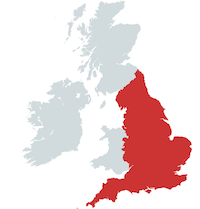
Map by mapchart.net - Some rights reserved.
Location
Tynemouth, Tyne and Wear, England
Description
Set on a headland near the North Pier, between the River Tyne and the North Sea, Tynemouth Castle is half a mile from the centre of the town in the north east of England.
Both the castle and the priory are in a state of ruin but what remains is well preserved.
The eastern end of the priory stands at almost its full height with narrow windows and large arches, behind is a small chapel with a vaulted roof and a rose window. The remains of the castle consist of a gatehouse and keep which are surrounded by parts of a curtain wall; also enclosing the priory, and a moat.
Facilities
The site is open to visitors daily from 10am between April and September and from Thursday to Monday from October to March.
Visitors can see the restored defense emplacements including an armory and guardroom, there is also limited access to the Gun Battery; visitors should ask a member of staff for details.
Due to its headland location the site is also a very good place to stop for a picnic.
History
The priory was built on the site in the early 7th century by Edwin of Northumbria and it became a place of pilgrimage when Oswin, King of Deira was buried there.
Tynemouth priory was plundered by the Danes in 800AD following which the monks strengthened the fortifications. The strengthening held off the Danes on their next attempt in 832, however in 865 both the church and the priory were destroyed. The Danes twice more plundered the site and in 875 the priory was totally destroyed leaving only the small church.
During the reign of Edward the Confessor, Earl Tostig took over the site and made plans to re-found the monastery, unfortunately he was killed at the battle of Stamford Bridge in 1066 and so his plans were never fulfilled.
By 1095 there was a wooden castle built on the site and there was a further attempt to re-found the monastery by the Earl of Northumberland, Robert de Mowbray. Due to a dispute the priory was placed under the jurisdiction of the Bishop of Durham but this did not stop the Earl who took refuge in the castle after rebelling against King William II. He was subsequently caught and imprisoned for treason.
In 1296 royal permission was granted to surround the monastery with stone walls and later a barbican and gatehouse were added to the castle. During the reign of Henry VIII the monastery was dissolved and along with its lands was granted to Sir Thomas Hilton although the castle still remained property of the crown and home to the Earl of Northumberland.
In the following years the castle was used as the site for a lighthouse, an army barracks and a coastal defense during World War II. The castle and priory are now under the care of English Heritage.
Other Castles in the Area
Lumley Castle, Co. Durham
Newcastle Castle Keep, Tyne and Wear
|
|
|
|

